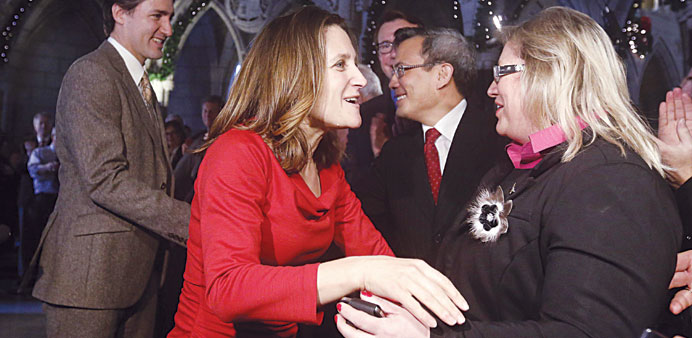|
Canada’s Liberals have strengthened their claim to be the main challenger to the governing Conservatives in the next general election after being thrust back into the political mainstream by a strong performance in four special elections. |
While much can change in the two years before the October 2015 general election, Monday night’s results have given new momentum to the Liberals - led by Justin Trudeau, son of former prime minister Pierre Trudeau - as they strive to get back into contention after a major setback in the 2011 election.
The ability to get voters who oppose the Conservatives to coalesce around one of Canada’s two main centre-left opposition parties is critical if one of them is to defeat Prime Minister Stephen Harper’s party in 2015.
There are some deep philosophical differences between the Liberals and the New Democratic Party (NDP) on their left. But some voters are happy to pick either one as an anti-Conservative standard bearer.
The NDP vaulted into second place behind the Conservatives in the 2011 election, buoyed by support for charismatic party leader Jack Layton, who died later in the year. It was the first time the NDP had won more seats than the Liberals in a national election.
The Liberals won just 34 seats in the 308-seat House of Commons to take third place, although they have pushed ahead of both the NDP and the Conservatives in recent opinion polls.
In Monday’s races to fill four vacant parliamentary seats, the Liberals held on to seats in Toronto and Montreal and leapfrogged over the NDP to come second in two Manitoba contests.
“The NDP is no longer the hopeful, optimistic party of Jack Layton,” Trudeau told supporters on Monday night. Seizing a line from Layton’s powerful deathbed message to Canadians, he added: “It is the Liberal Party tonight that proved that hope is stronger than fear.”
The NDP ran attack ads against Trudeau’s handpicked candidate in Toronto Centre, a voting district that includes both subsidized housing and some of the costliest homes in Canada.
Liberal candidate Chrystia Freeland, a former senior editor at Reuters, won comfortably.
Trudeau’s remarks about Layton drew bitter criticism from NDP leader Thomas Mulcair.
“That Justin Trudeau would use Jack Layton’s dying words as a political tool says everything that needs to be said about Justin Trudeau’s judgment and character,” Mulcair told reporters in foyer of the House of Commons.
Speaking minutes later at the same microphone, Trudeau was unapologetic. “I am, as many people are, inspired by Jack Layton’s legacy and the way he approached politics,” he said.
“When you’re being positive, when you’re being focused on bringing people together and not playing negative politics and other people are, I don’t think it’s negative to highlight the fact that people are being negative around you.”
Monday’s other major electoral story was the reduced Conservative vote in each race, with the party holding on to the two Manitoba seats by narrower margins than in 2011.
University of Toronto political scientist Nelson Wiseman said the Liberals are now clearly the main contenders to replace the Conservatives.
“Intellectually he is a lightweight compared to Harper and (NDP leader Thomas) Mulcair, and in a debate, while we don’t know if the debate will matter, they could turn him into mincemeat,” Wiseman said.
Responding, Trudeau said: “There is nothing new about people wanting to criticize me for all sorts of different things. I remain focused on Canadians.”

